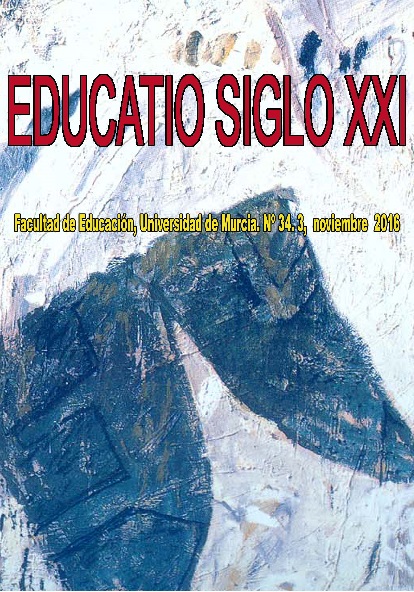La literatura como recurso formativo del príncipe: evolución a lo largo de la Baja Edad Media
Resumen
El presente artículo repasa la literatura medieval destinada a la formación de los príncipes avanzando para ello por la tradición historiográfica. Así, la necesidad de formar a un gobernante asesorado por unos consejeros en la misión de salvación de su pueblo sufrió un gran cambio durante los siglos XII-XIV: a) un primer momento centrado en definir las virtudes del“buen rey” en el Liber Iudicum del siglo VII español; b) un marcado carácter oriental venido de Al-Andalus, con un maestro filósofo como preceptor en los exempla morales de finales del XI y principios del XII; c) unión de herencia hispánica e influencias orientales y occidentales propia
del siglo XIII, donde el dominio occidental queda evidenciado de la mano de Egidio Romano y su De regimine principum. Es así como se alcanza el género de “espejos de príncipes” como compendio de tradiciones promovido por Alfonso X, quien con su famoso Especulo, Libro de las Siete Partidas y su definitivo Setenario da cabida al Secretum Secretorum aristotélico en la imagen ejemplarizante de su padre Fernando III.
Descargas
-
Resumen561
-
PDF478
Las obras que se publican en esta revista están sujetas a los siguientes términos:
1. El Servicio de Publicaciones de la Universidad de Murcia (la editorial) conserva los derechos patrimoniales (copyright) de las obras publicadas, y favorece y permite la reutilización de las mismas bajo la licencia de uso indicada en el punto 2.
2. Las obras se publican en la edición electrónica de la revista bajo una licencia Creative Commons Reconocimiento-NoComercial-SinObraDerivada 4.0 Internacional (texto legal). Se pueden copiar, usar, difundir, transmitir y exponer públicamente, siempre que: i) se cite la autoría y la fuente original de su publicación (revista, editorial y URL de la obra); ii) no se usen para fines comerciales; iii) se mencione la existencia y especificaciones de esta licencia de uso.
3. Condiciones de auto-archivo. Se permite y se anima a los autores a difundir electrónicamente las versiones pre-print (versión antes de ser evaluada) y/o post-print (versión evaluada y aceptada para su publicación) de sus obras antes de su publicación, ya que favorece su circulación y difusión más temprana y con ello un posible aumento en su citación y alcance entre la comunidad académica. Color RoMEO: verde.











